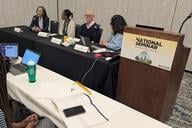You have /5 articles left.
Sign up for a free account or log in.
Should students hear the "n-word," a slur for black people, in class? And if a professor uses it and then apologizes, should that apology feature multiple uses of the word?
These questions are being debated at the Mercer University Law School, where black students are calling for the dismissal of a professor, David Oedel, who used the word in his constitutional law class -- without any need to do so, the students say.
Tiffany Watkins, a third-year student at the law school and president of the Black Law Students Association, said the group was not ruling out that there might be circumstances where there are pedagogical reasons to use the word. But the reason to do so needs to be essential, she said.
Oedel first used the word (according to his account and others) when discussing the way justices of the Supreme Court viewed Thurgood Marshall when he argued Brown v. Board of Education (as a lawyer, before he joined the high court). Then, a few days later, Oedel reportedly apologized to the class, but in doing so used the word several more times (some reports say up to 10 times).
"He was not using it for pedagogical purposes. He was just hurting students," Watkins said.
Oedel did not respond to an email seeking his views on events, but he sent an email to the law school in which he said: "I genuinely apologize for quoting a racial epithet in my Constitutional Law class, and unintentionally being the cause of upset at the law school. If even one student was wounded or distracted, that is one student too many, and that was my error alone as a teacher. I have learned something from this experience, and will never repeat that quotation again in any setting."
In his email, Oedel offered what he said was "the context" for his original use of the word. "In class, I initially quoted an African American at a Mercer symposium 14 years ago who was characterizing Thurgood Marshall’s role in switching the NAACP’s approach from one of advantageously using Plessy v. Ferguson’s 'separate but equal' rule to one of attacking Plessy v. Ferguson, a daring strategy that led ultimately to Brown v. Board of Education." He concluded his note by saying, "Please know that I am a firm supporter of racial equality and diversity in our community."
With students continuing to say that more is needed than an apology, Daisy Hurst Floyd, the law school dean, sent an email to students and faculty members last week.
"The Mercer University School of Law has a deep commitment to diversity and to providing a learning and work environment of respect, inclusion, and professionalism. In a recent Constitutional Law class, Professor Oedel’s conduct failed to live up to that commitment when he repeatedly used a racial epithet. Such conduct is unacceptable and will not be tolerated," she wrote.
"Following Professor Oedel’s acknowledgement that his behavior had been inappropriate, I decided that Professor Oedel would continue to teach the class for the remainder of the semester. This decision was made in close consultation with university officials and with a focus on what would best serve the students in the class, and was informed in part by students in the class telling me that other solutions would be disruptive to their learning," she said.
The dean wrote that she is continuing "to monitor how the Constitutional Law class is proceeding" and that she has "urged students to let me or others in the dean’s office know of any ongoing concerns they may have."
The university issued this statement, when asked about the situation: "Mercer Law School has a deep commitment to diversity and to promoting a learning and work environment of respect, inclusion, and professionalism. What happened recently in one of its classes failed to live up to that commitment. The faculty member has acknowledged that his conduct was inappropriate and has apologized, and the university has responded appropriately under its personnel policies. At times, and this is one of them, learning communities must take a hard look at how they can improve. The immediate focus has been on enabling the students in this class to complete the semester with no more disruption in their course of study than has already occurred. This is an ongoing process and the dean is working with students, faculty, alumni and other constituents of the law school to identify additional ways to advance the school’s commitment to diversity and inclusion; maintain an educational environment that enhances student learning; and foster collegiality, professionalism and constructive means of communication."
Watkins said members of her organization are not satisfied, and she said that this isn't a free speech issue. "I think that's deflecting the real issue," she said. "He used the word extensively, inappropriately and it caused a huge disruption. Certainly he has a right to say whatever he wants, but there is going to be a consequence."




